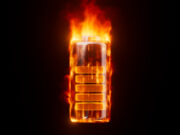The U.S. Department of Transportation (DOT) is moving to prohibit the transportation of lithium ion cells and batteries as cargo on passenger aircraft and to add new requirements for those being transported in cargo airplanes.
Transportation Secretary Elaine Chao said Wednesday that an interim final rule developed by the Department’s Pipeline and Hazardous Materials Safety Administration (PHMSA), working with the Federal Aviation Administration, “will strengthen safety for the traveling public by addressing the unique challenges lithium batteries pose in transportation.”
Limited exceptions will allow for transportation in passenger aircraft of no more than two replacement lithium cells or batteries for use in medical devices. The interim final rule also will require that lithium ion cells and batteries be shipped aboard cargo aircraft “at not more than a 30 percent state of charge.”
The interim rule is intended to prevent an in-flight fire caused by thermal runaway, a chain reaction in which lithium battery cells overheat and burn, with flames spreading to adjacent battery cells and nearby flammable materials.
PHMSA says it has identified 13 incidents in air cargo transportation between 2010 and 2016 involving lithium batteries and smoke, fire, extreme heat, or explosion that would have been affected by this rulemaking.
The rule, which is intended for publication on an unspecified date in the Federal Register and which will take effect upon publication, does not prevent passengers or crewmembers from boarding with personal items powered by lithium cells or batteries. It also does not prevent the transportation in cargo aircraft of lithium cells or batteries at greater than a 30 percent charge if they are packed with or contained in electronic devices.
The PHMSA said the early effective date of the rule was prompted by the risks of a lithium battery incident, a deadline for action that was included in recent legislation and the need to harmonize U.S. rules with International Civil Aviation Organization (ICAO) standards. The agency will accept public comments for 60 days after publication of the interim rule, and the measure may be amended later, PHMSA said.
“The safe transport of lithium batteries by air has been an ongoing concern due to the unique challenges they pose to safety in the air transportation environment,” the Federal Register announcement said. “Unlike other hazardous materials, lithium batteries contain both a chemical and an electrical hazard. This combination of hazards, when involved in a fire encompassing significant quantities of lithium batteries, may exceed the fire suppression capability of the aircraft and lead to a catastrophic loss of the aircraft.”
Capt. Joe DePete, president of the Air Line Pilots Association, International (ALPA), described the rulemaking as a “major enhancement to U.S. aviation safety” that brings U.S. rules in line with standards set forth by ICAO.


